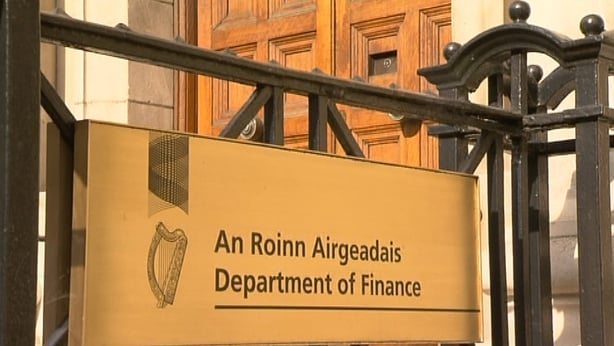A review into allegations made by a whistleblower of impropriety at the banking inquiry, has concluded that they contain no substance whatsoever.
SC Senan Allen has said the committee was not provided with false information, no participant attempted to obtain favourable treatment and procedures to deal with conflicts of interest were robust.
Mr Allen said the whistleblower report contained very serious allegations but it was made up of a good deal of suspicion and much less in the way of hard information.
He said an employee alleged to have leaked information did not do so.
Earlier, former minister and tánaiste Mary Coughlan told the banking inquiry that prior to September 2008, no concerns were expressed within Government regarding the strength of financial regulation.
Ms Coughlan said there was never a concern that the day-to-day regulation of Irish banks was not robust enough.
She said the supervisory regime failed to prevent grossly excessive and irresponsible lending and failed to properly judge the level of exposure and risk in banks.
In her written statement to the inquiry, Ms Coughlan said she wanted to put on record her regret at the difficult consequences felt by so many families across Ireland.
She said only the passage of time would tell whether the then government got everything correct.
Meanwhile, one of the country's leading corporate governance experts who served on the board of Ulster Bank said directors were not satisfied about the bank's boom-time mortgage lending and continually raised it with management.
Niamh Brennan, who is a Director of the UCD Centre for Corporate Governance, made the remarks in a written submission to the banking inquiry.
Ms Brennan said she was aware of mortgage lending outside the bank's stated lending policies.
She added the board expressed concerns at mortgage lending outside these policies and were not satisified about actions taken by management.
She also said executives in Ireland were under pressure from Fred Godwin, CEO of Ulster Bank's parent group Royal Bank of Scotland, who exerted an "adverse" influence.
Ms Brennan said board minutes show Ulster Bank directors had expressed concerns about exposure to lending to construction "as early as 2001".
She added that management assured directors "there were no sectoral concentration issues."
Banking supervision levels defended
An executive at State Street Investment Services has defended regulation of the IFSC and has disputed that supervision was set at a level to attract foreign financial institutions.
In his written submission to the banking inquiry, Mr Slattery also said tax income from the banking sector was not a factor in regulation levels.
Mr Slattery is the head of State Street Europe, Middle East and Africa and was head of the Irish division until 2012.
He worked at the Central Bank from 1973 to 1996 where he headed up its Banking Supervision Division and also held responsibility for developing supervisory policy on the IFSC.
On the Regulator's abandoned plans to vet bank directors, Mr Slattery said he argued that regulations for large Irish companies were not necessarily suitable for subsidiaries of international institutions.
Mr Slattery said that when he predicted a drop of up to 50% in house prices in 2000, he was strongly criticised by Bank of Ireland's chief economist.
Government had wanted a soft landing - former Finance official
A former senior Department of Finance official has told the banking inquiry that the reason a soft landing scenario was accepted by the Department was because the government wanted a soft landing.
In his written submission, former Assistant Principal Robert Pye also strongly criticised its oversight of banking and regulation saying the massive increase in developer and household borrowing was never flagged as risks.

He said they had the expertise, but were unwilling to contradict any aspect of public policy that differed, even moderately, from the stance favoured by the government.
He said the mindset was so heavily ingrained that senior managers virtually lost the ability to take an adversarial position on anything.
Contrarian views were strongly discouraged and an expression one often heard in the Department at that time was "don't rock the boat".
He said the decentralisation scheme "conflicted outrageously" with department policy but not one senior manager challenged what he called a ridiculous volteface
What the politicians wanted, the politicians got. It was that simple, he said.
Mr Pye added that he did not believe the inquiry's questionnaire focussed adequately on the points of concern raised in his detailed submission.
He also disputed some of the findings of the Wright Report which found failings in the Department of Finance.
Central Bank had no choice about dropping plans to remove some bank directors
And a former board member of the Central Bank and the Financial Regulator said the Financial Regulator had no choice but to abandon its plans to remove some directors of banks.
In her written witness statement to the banking inquiry, Deirdre Purcell said the process was protracted and fiercely opposed by the industry and one disqualified person challenged the decision in a court case which cost the Regulator €750,000.
Ms Purcell is a journalist and was a non-executive board member.
She said she was surprised when asked by the Minister to join the new boards and told him she had no academic or professional qualifications in banking. He responded that he had heard that she had a reputation as a "strong and independent woman".
She said she did not recall information at board meetings being challenged by any of the three Secretaries General who represented the Department of Finance during her seven years.
She said comments seemed to "err on the side of caution generally prevalent in the Central Bank about "spooking" the markets or damaging confidence in the Irish financial system".
The Governor, she said, had a state of constant caution about how the bank's public statements would be received and how they might affect the economy, the markets and financial happenings.
She said the Regulator did have concerns that the number of specialist staff in the prudential area, particularly in the supervision Department, was far from sufficient but the recruitment process was slow and unwieldy.
The Financial Regulator had a conflict of interest in also being responsible for promoting the financial services industry, she added.
Greater note of alarm from Central Bank could have lessened crisis
Senior Council Gerry Danaher, in a written submission to the banking inquiry, said that had a greater note of alarm been sounded in Central Bank reports and had it provoked a reaction - such as a fall in house prices - then the actual crisis when it came might have been ameliorated.
Gerry Danaher was a member of the Board of the Central Bank from 1998 to 2010 and of the Financial Regulatory Authority from 2003 to 2010.
Mr Danaher said that it appeared to him that there was more concern in the Bank about what could happen in the immediate future if the alarm was too loudly sounded than about the prospects of what might happen "down the road" if it was not.
"I regret that before 2006 I did not sufficiently challenge the benign tone adopted and that, subsequently, I was unable to bring about a more alarmist one," he stated.
He also said there was a widespread view in the Central Bank that housing prices would fall but the potential extent and consequences of a "burst", as predicted by economist Morgan Kelly, was wholly underestimated.
Mr Danaher said the Financial Regular appeared to be "very significantly focused" on consumer issues. He said that the Financial Regulator did not seek significant additional powers in relation to the banks and never fully availed of the powers it had.

He said the increases to capital ratio requirements and the imposition of heavier capital weights on certain mortgages could have been made greater and should have been made earlier.
"It was not a lack of power to do so but excessive caution which, in my view, led to the steps in question being too little and too late. It is clear that the prudential supervision of the banks was not effectively conducted," he said.
He also told the banking inquiry that he did not recall any influence being exerted by the Department of Finance on the Central Bank, adding that there always seemed to be a good relationship between the Bank and the Department.
Mr Danaher also said he did not believe there was undue "deference" by the Central Bank Board to the government of the day.
He also said that it did not occur to him that there was a shortage of economic expertise in the Central Bank. Not many economists outside the Central Bank seemed to differ much with the economic analysis emanating from the Central Bank, he added.
Among the staff, he also said there was no shortage of people with expertise of supervising banks.
He said that from 2006, he was very alarmed by what seemed to him to be a collapsing residential property market. "I was also concerned about the implications of the astounding rise in site acquisition costs and speculative bank lending," he stated.
But he added that before 2005, he had no greater concerns than the vast majority of his colleagues about the economy in general and the stability of the Irish banking system in particular.
Former chairman of the Financial Regulator has blamed employers group IBEC, the banks and the Department of Finance for blocking steps to ensure banks were run properly.
Jim Farrell made the comments in a written submission to the inquiry.
He said the regulator's initiative to promote better governance such as compliance statements by directors was subject to intensive lobbying by the banks and IBEC.
He said "this pressure led to the Department of Finance writing to the Regulator requesting that the initiative not proceed with without first consulting the Department."
He added this was a "classic example of the lobbying powers of banks and lack of proper interest in proper governance in the banking sector."
He said it was an example of "inappropriate intrusion by the Department of Finance into what was a regulatory matter."

